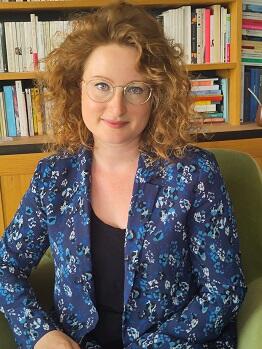
Aurore Turbiau
Doctor in Comparative Literature and Winner of the Open Science Thesis Prize
"Literary scholars have much to gain from engaging with open science, and scientists can benefit from understanding our approaches better."
Recognized with the Open Science Thesis Prize, Aurore Turbiau, a Doctor in Comparative Literature from Sorbonne University, represents a new generation of committed researchers. Through the study of a corpus comprising hundreds of works, she delves into feminist issues and gender dynamics in literature. Her work, rooted in international collaborations and the development of digital tools, is helping to transform research methods in the humanities and social sciences.
After completing a master’s in literary theory, Aurore Turbiau decided to take a break from research to explore a new field: editorial communication. This impactful interlude allowed her to venture into coding. “I wanted to understand the tools I was working with. During this master’s program, I taught myself to code,” she explains. This skill would later become a valuable asset when she returned to research. “When I came back, it was with the certainty that I would do feminist research or nothing at all.”
Her dissertation, which she began in 2018, examines feminist engagement in French and Quebecois literature. It was a deliberate choice. While anglophone feminist literature enjoys significant visibility, those in the francophone world remain less known. “I wanted to help address this gap. Within the francophone sphere, Quebec particularly interested me for its connections with France and the richness of the transatlantic feminist literary network.”
For Aurore Turbiau, working on these themes is not merely an academic exercise—it is also a personal commitment. “I left research after my initial work on writer Louis-Ferdinand Céline, a notorious anti-Semite, because I couldn’t understand why I was investing my energy in studying a well-known writer whose views I strongly disapproved of. Returning to research was a return with a political conviction: to better understand feminist voices.”
“This prize shows that even in literature, open science has its place.”
In parallel with her research, Aurore Turbiau developed a bespoke software tool, Litote, to meet her specific needs for managing textual data. “I started by coding a very basic tool, which grew alongside my needs over the years.”
The originality of Aurore Turbiau’s project, which exemplifies a fully realized open science approach, earned her the Open Science Prize for initiatives involving open-source software, research data, and theses. Her dissertation is published in an open archive, the database hosted on Huma-Num, her code shared on Software Heritage, and all materials accompanied by detailed documentation on a Hypotheses blog. In short, all outputs are accessible and available. “This prize demonstrates that even in literature, open sciences have a place. I hope to one day work with a team to improve Litote and make it widely available.”
Aurore Turbiau draws on a rich literary and intellectual heritage to guide her work. French novelist and feminist icon Monique Wittig holds a central place in her journey. “She’s an author who unites academic and activist circles. I regularly collaborate with the Friends of Monique Wittig association to organize readings, engage in popular education, and promote her texts and works. It’s a way of bridging academia and civil society.”
She also highlights two other inspiring authors: Christiane Rochefort, for her irreverence, and Quebecois writer France Théoret, who encouraged her to view her dissertation as a form of writing in its own right.
Challenges in a Growing Field
Interest in feminist studies is growing, but Aurore Turbiau remains realistic. “We talk a lot about gender studies, but often superficially. Building expertise requires robust structures: dedicated academic programs, chairs, and positions. Today, unlike in Quebec, there are still too few of us able to focus on these topics.”
She hopes her research will help solidify this momentum while raising awareness among the public and the academic community about digital issues. “Literary scholars have much to gain from engaging with open sciences, and scientists can also better understand our specific approaches and challenges. This dialogue is essential.”
As for what’s next for Aurore Turbiau, she plans to remain true to her original ambitions: teaching and sharing knowledge while continuing her work on feminism and literature.
Par Pauline Ponchaux
1 Master Conseil éditorial et gestion de contenus plurimédias
The Sorbonne University Research Data and Digital Humanities Unit
The Research Data and Digital Humanities Unit supported Aurore Turbiau in the recognition and development of her software: “It’s thanks to them that I applied for the Open Science Thesis Prize.”
This unit at Sorbonne University assists researchers in managing, sharing, and enhancing their scientific data. It promotes adherence to the FAIR principles (Findable, Accessible, Interoperable, Reusable), ensuring that data produced as part of research projects are accessible, understandable, and reusable by the scientific community.
One example of this support is the LabRADoR project, which provides resources and training to help researchers structure their data and meet the growing demands of open science practices.
